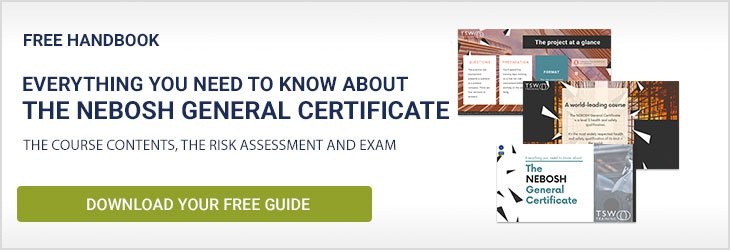The NEBOSH General Certificate is recognised all over the world. You can take it with you wherever you work.
NEBOSH is the gold standard in health and safety and its qualifications are respected and recognised the world over. If you’re choosing which is right for you, there are two versions of the NEBOSH General Certificate – the International and National.
Key points
- The International and National NEBOSH General Certificate are very similar – they’re both level 3 qualifications that give you a Technical IOSH Membership.
- The qualifications differ when it comes to legislation and laws – the National is focused on the UK’s key legal requirements.
- The National General Certificate will serve your career well wherever you work in the world. If you have no plans to work overseas, you don’t need to take the International qualification.
Compare the International and National NEBOSH General Certificates
| International General Certificate | National General Certificate | |
| What will you know? |
How to effectively manage health and safety. How to identify and control common workplace hazards. How to measure if you’ve been successful. Relevant key international standards. |
How to effectively manage health and safety. How to identify and control common workplace hazards. How to measure if you’ve been successful. The UK’s key legal requirements |
| What will you be able to do? |
Confidently carry out risk assessments. Develop and implement a detailed action plan. Manage and minimise workplace risks. Support and develop your company’s health and safety culture. |
Confidently carry out risk assessments. Develop and implement a detailed action plan. Manage and minimise workplace risks. Support and develop your company’s health and safety culture. |
| Entry requirements | None | None |
| Teaching hours | 65 | 68 |
| Revision hours | 40 | 40 |
| Assessment | Exam and practical risk assessment. | Exam and practical risk assessment. |
| Who’s it for? | Managers, supervisors and anyone who wants to start a career in health and safety. | Managers, supervisors and anyone who wants to start a career in health and safety. |
| Membership entitlement |
Associate Membership (AIOSH) of the Institution of Occupational Safety and Health (IOSH). Technical Membership (Tech IOSH) of IOSH. |
Associate Membership (AIOSH) of the Institution of Occupational Safety and Health (IOSH). Technical Membership (Tech IOSH) of IOSH. |
| Level | 3 | 3 |
Although they appear very similar, the National General Certificate is focused on UK law.
The earlier elements in NG1 walk you through the UK laws and legislation, relevant to health and safety.
They show you how to be compliant:
- Health and Safety Work Act 1974 sections 2–4, 6–9, 36 and 37
- Management of Health and Safety at Work regulations 1999,3–5, 7, 8, 10 and 13–1
- The Corporate Manslaughter and Corporate Homicide Act 2007
- Construction (Design and Management) Regulations 2015
- ISO 45001:2018
*You get to grips with UK law very early in the course.
In element 1.2, you’ll look at:
- Statute law and the relationship between Acts of Parliament, regulations, approved codes of practice and official guidance.
- Absolute and qualified duties (practicable and reasonably practicable).
- Common law, precedents and case law and the importance of common law.
- Relevance of statute and common law to criminal and civil law.
- Types of law, including criminal laws, including offences against the state, prosecution to establish guilt, burden and onus of proof.
- Civil law, for example, people seeking compensation, burden of proof and statute-barred.
- The role, functions and powers of criminal law liabilities.
- The role of the Health and Safety Executive (HSE) and HSE Northern Ireland (HSENI), Procurator Fiscal (Scotland) and your local authority.
- Why fees for intervention (FFI) are charged.
- Powers of inspectors, enforcement notices including improvement and prohibition.
- Conditions for serving, rights and effects of appeal, penalties for failure to comply and simple cautions.
- Prosecution, offences and relevant penalties,
- The Corporate Manslaughter and Corporate Homicide Act 2007, offences, penalties and defences.
- Civil law liabilities, including civil wrong, duty of care, tests and defences for tort/delict of negligence.
- Duty owed, duty breached, injury and damage sustained.
- Contributory negligence.
- Vicarious liability.
- The employer’s legal duty to provide a safe place of work, safe plant and equipment, safe systems of work, training and supervision, and competent workers.
- Breach of statutory duty in relation to new and expectant mothers.
It’s a thorough element for a reason. You must closely observe specific legislation to keep you, your colleagues and business safe and compliant with the law.
*Questions about UK legislation will more than likely crop up during your NG1 exam.
Will you need to retrain if you work overseas?
The National qualification symbolises a thorough and in-depth understanding of health and safety and practical expertise. You’re an asset to any employer, in any country.
If you’re working in the UK now and for the foreseeable future, the National Certificate programme contains UK-relevant information and will serve you well in any UK-based role.
Any further questions?
If you’d like to know more about NEBOSH, the courses they offer and whether they’re the right course for you and your organisation, take a look at our FAQ page, or get in touch with our team of NEBOSH experts.








